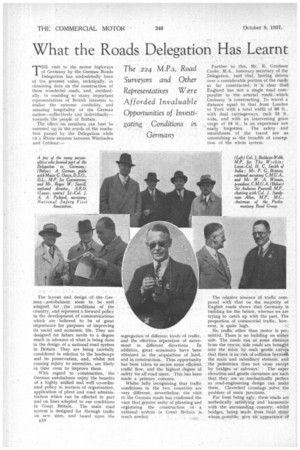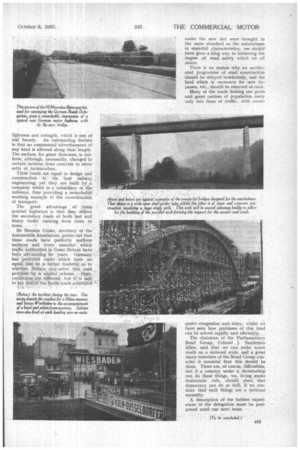What the Roads Delegation Has Learnt
Page 44

Page 45

If you've noticed an error in this article please click here to report it so we can fix it.
The 224 M P.s, Road Surveyors and Other Representatives Were Afforded Invaluable Opportunities of investigating Conditions in
Germany
THE visit to the motor highways ol Germany by the German Roads Delegation has undoubtedly been of the greatest value, technically, in obtaining data on the construction of these wonderful roads, and, incidentally, in enabling so many important representatives of British interests to realize the extreme cordiality and amazing hospitality of the German nation—collectively and individually— towards the people of Britain.
The effect on members can best be summed up in the _words of the resolution passed by the Delegation while on a Rhine steamer between Wiesbaden and Coblenz:—
The layoat and design. of the German autobahnen seem to be . well adapted for the conditions of the country, and represent a forward policy in -the development of communications which are believed to be of great importance for purposes of improving its social and economic life. They are designed for future needs to a degree much in advance of what is being done in the design of a national road system in Britain. They are being carefully considered in relation to the landscape and its preservation, and, whilst not causing injury to amenities, are likely in time even to improve them.
With regard to construction, the German autobahnen enjoy the benefits of a highly unified and well co-ordinated policy in matters of organization, application of plant and road administration which can be effected in part and on lines adapted to our conditions in Great Britain. The main road system is designed for through traffic on new sites, and based upon the segregation of different kinds of traffic, and the effective separation of movement in different directions. In addition,. great economies have , been obtained in the acquisition of land, and in construction. Thus opportunity has been taken to secure more efficient traffic flow, and the highest degree of safety for all 'road users. This has been made a primary .concern.
Whilst fully recognizing that traffic conditions in the two countries are very different,. nevertheless, the visit to the German roads ha,s confirmed the view that greater unity of planning and organizing the construction of a national system in Great Britain is much needed.
Further to this, Mr. R. Gresham Cooke, M.A., honorary secretary of the Delegation, said that, having driven over a considerable portion of the roads so far constructed, it is dear that; England has not a single road cornparable to the arterial roads which Germany is constructing. To travel a distance equal to that from London to York with a total width of 80 ft., with dual carriageways, each 25 ft. wide, and with an intervening grass verge of 16 ft., is an experience not "easily forgotten. The safety and smoothness of the travel are as astonishing as the breadth of conception of the whole system.
The relative absence of traffic compared with that on the majority of English roads shows that Germany is building for the future, whereas we are trying to catch up with the past. The proportion of commercial traffic, however, is quite high.
No traffic other than motor is permitted. There is no building on either side. The roads run at some distance from the towns; side roads are brought into the .main by such gentle curves that there is norisk of collision betweeVi the main and subsidiary streams, and the pedestrian does not cross except by bridgesor subways. The super elevation.and.gentle curvature are such that they are as mechanically perfect as road-engineering design can make them. Cloverleaf crossings solve the problem of main junctions.."
Far from being ugly, these roads are sthetically satisfying and " harindnize with they surrounding. country, whilst bridges, rheing made from local stone where daossible-,. give air:appearance of lightness and strength, which is one of real beauty. An outstanding feature is that no commercial advertisement of any kind is allowed along their Ian The surface, for great distances, is uniform, although, necessarily, changed in certain sections from concrete to stone setts or tarmacadam.
These roads are equa,I in design and construction to the best railway engineering; yet they are built by -a company which is a subsidiary of the railways, thus providing a remarkable working example of the co-ordination of transport. • The great advantage of these. arterial highways is that they relieve the secondary roads of both fast and heavy traffic running from town to town.
Sir Stenson Cooke, secretary of the Automobile Association, points out that these roads have perfectly uniform surfaces and every essential . which traffic authorities in Great Britain have been advocating for years. Germany • has provided roads which have no equal, but he is rather doubtful as to whether -Britain cs.n.,.solve this road problem by a similar scheme. • Here, conditions are different, but it is Safe to say that if the trunk roads scheduled
under the new Act were brought to the same standard as the autobahnen in essential characteristics, weshoiald have gone a long way to achieving the degree of road safety which we all desire.
There is no reason why an accelerated programme of road construction should be delayed indefinitely, and the land which is necessary for new bypasses, etc., should be reserved at once.
Many of the roads linking our ports and great centres of population carry only two lines of traffic, with con se quent congestion and, delay, whilst we have seen how problems of this kind can be solved rapidly and efficiently.
The chairman of the Parliamentary Road Group, Colonel J. Sandeman Allen, said that we can make, trunk roads on a national scale, and a great many members of the Road Group consider it essential that this should be done. There are, of course, difficulties, but if a country under a dictatorship can do these things, we, living under democratic rule, should show. that democracy, can do as well, if we consider that such things are a national necessity.
A description of the further experiences of the delegation must be postponed until our next issue.




























































































